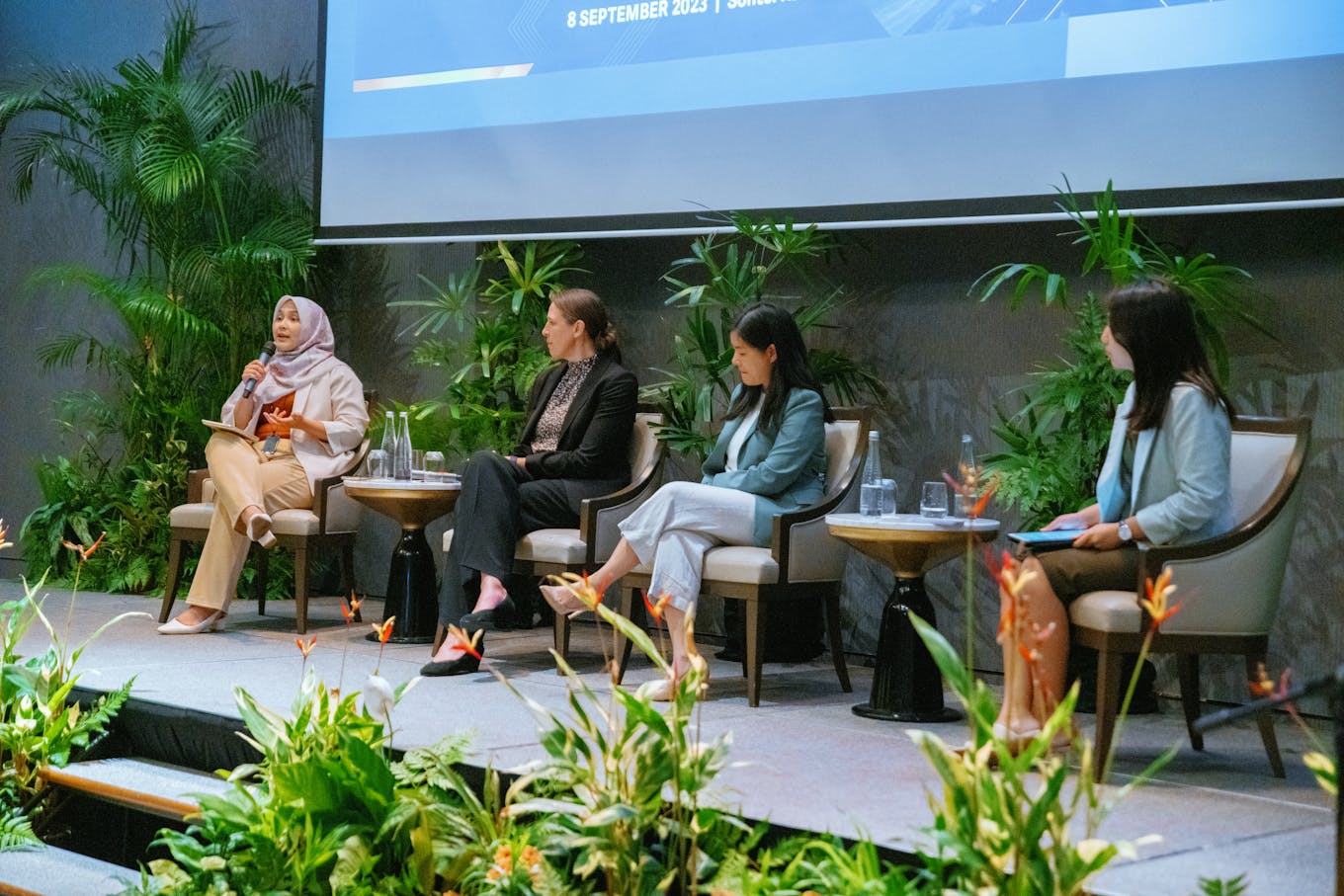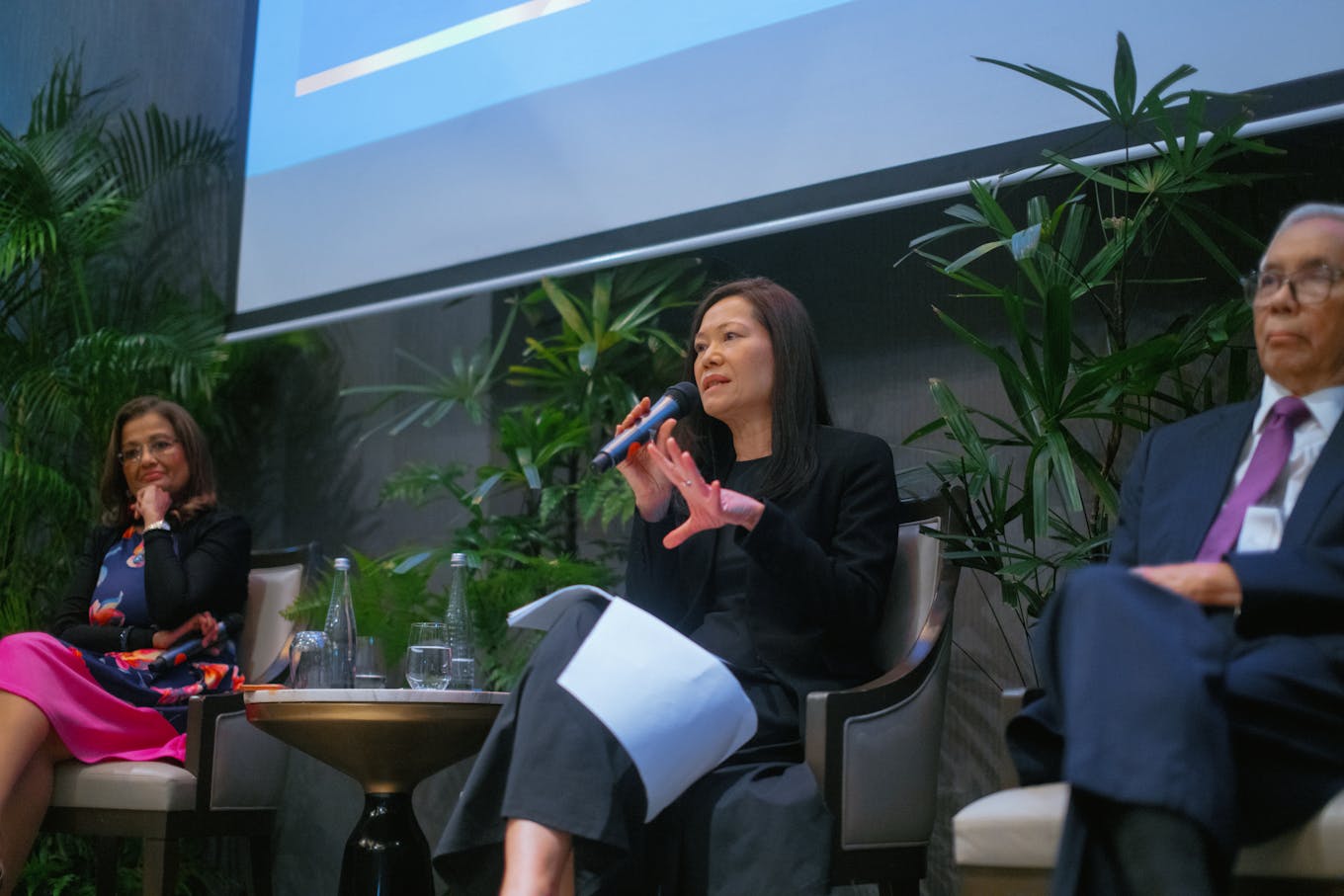[ad_1]
Scalable financing channels designed to funnel money to help a country shift away from fossil fuels, such as energy transition mechanisms (ETMs) that neighbouring economies have already adopted, are increasingly attractive to Malaysia.
But the country will need to find the correct formula that can finance its transition while meeting investor expectations on returns on investment, said representatives from key financial institutions at a Kuala Lumpur conference organised by Eco-Business.
Nur Syairah Husna binti Mohd Ridzuan, climate policy strategist at Bank Negara Malaysia, speaking at the Unlocking capital for finance Malaysia event last Friday cited the Just Energy Transition Partnership (JETP) that Indonesia and Vietnam are already on board as one of the “interesting developments” to have emerged.
“While a return on investment is still a big question mark, we now have the opportunity of shifting away from fossil fuels,” she said, adding that the central bank recognises the scaleability of such ETMs and how attractive it would be for investors, even as it is still unsure if it will work for Malaysia. “We are at the exploratory phase.”

Energy transition mechanisms that are emerging could give Malaysia the opportunity of accelerating its shift away from fossil fuels, said Nur Syairah Husna binti Mohd Ridzuan, climate policy strategist at Bank Negara Malaysia (from left) at the Unlocking capital for sustainability event in Kuala Lumpur. Others on the panel include Wendy Mackay, managing director, Pollination and Melissa Moi, head of sustainable business, Group Corporate Sustainability Office, United Overseas Bank. Eco-Business regional correspondent Samantha Ho moderated the session. Image: Eco-Business
JETP initiatives are intended to provide affordable financing from richer countries to clean up coal-dependent power grids in developing nations. South Africa, Indonesia and Vietnam are the first three countries to receive funding from the programme, although the much-anticipated US$20 billion investment deal in Indonesia has been pushed back due to technical and financing issues.
Melissa Moi, head of sustainable business, group corporate sustainability office at United Overseas Bank (UOB), said there is a need to understand the different financing structures deployed in ETMs, including the “extremely complex ecosystem” of supporting mechanisms that ensures that risk of investments are spread out. “Conceptually, blended finance has been around for a very, very long time, and it hasn’t been easy to scale,” she said.
“One of the challenges is: can (investors) expect returns at this point? Not at the moment, but in the future, I think yes, if we have the right policy environment,” said Moi, highlighting how carbon taxes can ensure that the real cost of carbon emissions is included in calculations. “(It will happen) when we see more of these types of unique mechanisms, where the shutdown of coal-fired power plants are combined with the uptake of renewables, and a gap in energy provision can be bridged.”
“Right now, a lot of people are having intelligent conversations about this, there are theoretical and academic proposals, but we haven’t found the magic bullet,” she said.
Malaysia will need considerable investments in renewables to fund its own energy transition. The country’s recently published National Energy Transition Roadmap (NETR) estimates that RM 1.3 trillion (US$280 billion) of investments is needed to meet Malaysia’s energy transition needs.
But where should investors be placing their money and directing their efforts to support a just energy transition for Malaysia?
Wendy Mackay, managing director of investment and advisory firm Pollination, suggested that in addition to curbing carbon emissions, organisations should also think about what roles their company can play in a low carbon economy and use that answer to inform where they are going to invest in people, knowledge, new business models and new technologies.
“
We need new models where there is actually a sense that this is not just a new version of colonialism, that it is actually fair and just [for the recipients of the investments].
Wendy Mackay, managing director, Pollination
“You need to do the Scopes [1, 2 and 3] because that is what people are demanding of you,” said Mackay, referring to how companies need to tackle both direct and indirect emissions in their supply chains. ”But it is going to become increasingly important to think about how to generate value in a decarbonised world.”
Moi observed that institutional investors are starting to better understand that there are different types of capital deployment that are needed – beyond focusing on green assets such as solar power and other renewables – to accelerate the energy transition.
“There is still a fundamental disconnect between how we are seeing high quality ambition – because people don’t want to be called out for green washing – and what is actually implementable and pragmatic from a real economy perspective,” she said. She added that guidance needs to be provided to brown sectors, which are high carbon-emitting industries, on their decarbonisation pathways.
Moi said that financial institutions should work with their clients and find a decarbonisation pathway to commit to. While the gold standards are scientifically-based international pathways, UOB made a decision to also look at regional pathways, said Moi.
When the bank committed to its 2050 net-zero targets across six sectors in October last year, it said that it will base its sectoral targets on regional pathways “that align with global net-zero goals”, “using internationally-recognised climate science models”, reflecting an approach which addresses the “need for a just transition in Southeast Asia that continues to support economic growth and improve energy access across the region’s diverse economies”.
“We were one of the first to market it. It was a bit of risk,” said Moi. However, she said feedback on the move so far is that it makes sense, and that each client’s decarbonisation journey will be different, with situations constantly evolving. “Countries will change, they will improve their trajectory and become more ambitious [in reducing emissions],” she said.
Mackay noted that while the idea of green investments and transition investments have become mainstream, attracting many private investors, there is a need to de-risk investments to make climate projects more bankable. She said governments and multilateral development banks need to step in and provide guarantees and first lost equity – in this instance, to bear first losses to catalyse the participation of co-investors who would not have otherwise entered the deal – to enable that to happen.
“We need new models where there is actually a sense that this is not just a new version of colonialism, that it is actually fair and just [for the recipients of the investments],” said Mackay.
New forms of collaboration in the investment space are also emerging. Mackay said that a green hydrogen project in Australia that involved Pollination has seen traditional stakeholders having a greater influence on the project’s outcome. It is a transition from traditional owners being “just consulted” to them being part of the process and financially benefiting from the project now, she explained.
Boards need better understanding

Corporates need to integrate sustainability in their key decision-making processes, said Michele Kythe Lim, president of the Institute of Corporate Directors Malaysia (centre) at the Unlocking capital for sustainability event in Kuala Lumpur. Others on the fireside chat include Dr Kalanithi Nesaretnam, co-founder, Climate Governance Malaysia (left), and Professor Emeritus Tan Sri Dr Zakri Abdul Hamid, chairman, Business Council for Sustainable Development Malaysia; chairman, Atri Advisory (right). Image: Eco-Business.
Speaking at the fireside chat session of the conference, Michele Kythe Lim, president of the Institute of Corporate Directors Malaysia (ICDM), said that board members in Malaysia still lack knowledge on the just transition and sustainability.
ICDM recently started “Leading for Impact” (LIP), a mandatory accreditation programme on sustainability for directors in Malaysian public listed companies. According to Lim, from a classroom of 70 board members who registered in the programme, two-thirds knew nothing about sustainability, while one-third of the participants said they are still somewhere along their sustainability journey.
“They do recognise how important it is, and many of them need help,” she said. Lim added that the primary issue is not challenges with disclosure, but how corporates can integrate sustainability considerations in their key decisions. “It needs to be internalised, integrated into businesses, and then reported on.”
The next Unlocking capital for sustainability event will be held in Manila, Philippines on 14 September. Register here for the event.
[ad_2]
Source link
